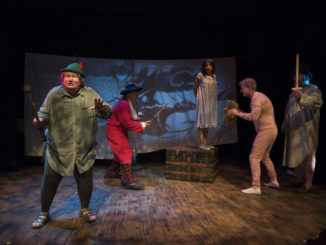

Philip Dawkins is one of my favorite playwrights; his plays The Burn and Le Switch both blew my mind with their intelligent construction, nuanced and vivid characters, and powerful insights into the human condition. His latest work, The Gentleman Caller, commissioned by and currently in production at the Raven Theatre, is no exception. Centering on the relationship between legendary American playwright Tennessee Williams and his lesser-known contemporary William Inge, The Gentleman Caller is as much as an examination of the nature of art and arts criticism as it is a messy and fascinating love story.

Williams opens the show with a monologue addressed to the audience; this metatheatrical style continues throughout the show with Williams making frequent asides to the audience and occasional reference to the fact that the characters are in a play. This style is further highlighted in scenic design by Jeffrey D. Kmiec, which lays bare the wooden planks and nails that surround the stage, creating the very kind of “wooden box” that Williams and Inge reference when they talk about theatre and television. When Williams and Inge meet, it is ostensibly so that Inge, at that time an arts critic for a St. Louis newspaper, can interview Williams, but the interview quickly goes sideways as the men’s shared secret of their homosexuality comes out into the open and their discussions become much more intense and personal than the average newspaper interview.

Rudy Galvan is spellbinding as Williams, oozing Southern charm and sharp, witty humor with every line. But for all his surface-level charisma, Williams is also a deeply troubled man, in constant conflict with his family, the critics who denounced his early work, and most of all, himself. Galvan haunts these dark places in his performance, too, lending as much verisimilitude to Williams’ pain as to his joviality. Curtis Edward Jackson makes for a fantastic counterpoint: he is tight-laced where Galvan’s Williams is laid-back (qualities highlighted well by costume designer Melissa Ng); serious where Williams is filled with humor; and anxious to hide his sexuality where Williams embraces it openly.

Still, the two men have much in common, from their obsession with theatre to their inner self-loathing. As the two come together and fall apart in a kind of verbal dance, the play dives deeper into both their characters and their ideologies. The play is packed with ideas about what it means to be an artist and, of most interest to me, the effect of critics on an artist’s work. In the world Dawkins creates here, critics are mainly a force to crush artistic voices—Williams refers to the first reviewed production of The Glass Menagerie as facing an executioner—but at times critics’ praise is what drives Williams’ success, and Inge’s role as a critic, which exposes him to Williams’ work, is what draws him to Williams in the first place.

The Gentleman Caller is witty, engaging, sexy, romantic, and dark in a tapestry of tones and text that is bursting at the seams with complex ideas and beautiful storytelling. It’s no wonder this production has already been extended; it would be a shame not to offer it to as many audience members as possible.
Ticket Information
Location: Raven Theatre West Stage, 6157 N. Clark St. (at Granville), Chicago
Regular run: Friday, April 6 – Sunday, May 27, 2018
Curtain Times: Thursdays, Fridays and Saturdays at 8 pm; Sundays at 3:30 pm.
Please note: there will not be a performance on Thursday, April 5.
Tickets: Regular run $46 ($43 if purchased online). Seniors/teachers $41 ($38 if purchased online). Students/active military and veterans $15. Every Thursday is “Under 30 Thursday,” when patrons under age 30 can purchase tickets for $15. Single tickets and
season subscriptions for the 2018-19 Season are currently available at the Raven Theatre website or by calling (773) 338-2177.
All photos by Michael Brosilow.




Be the first to comment